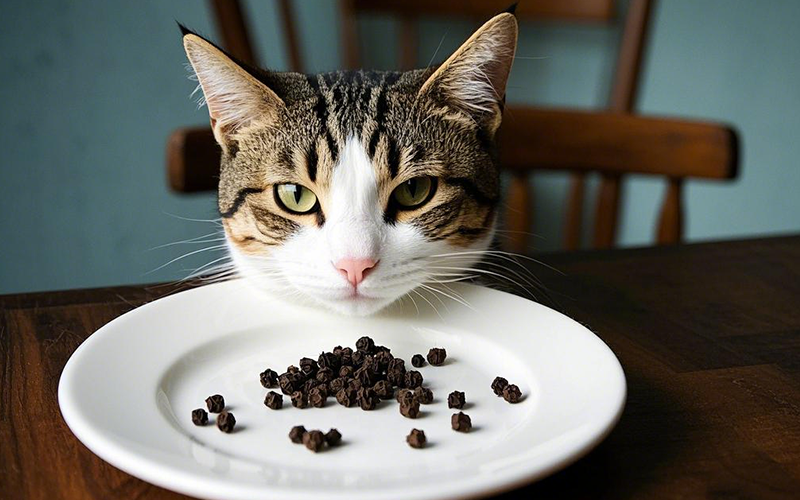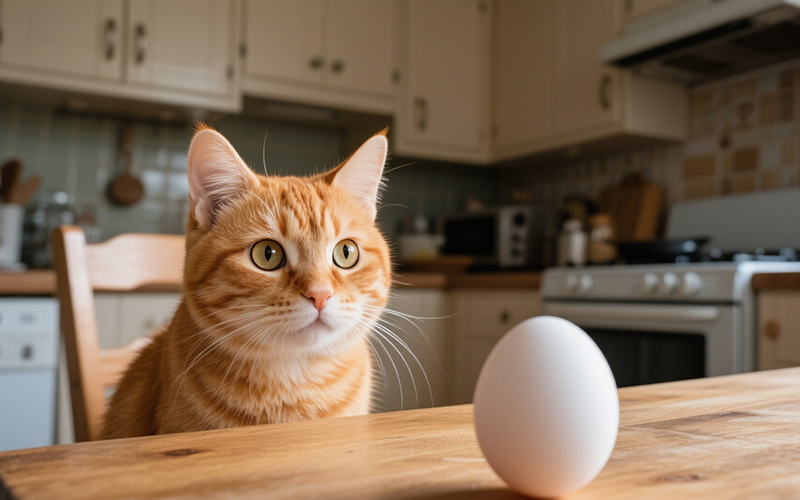Can Cats Eat Black Pepper? What You Need to Know
- 15 Mar 2025 13:57
As a cat owner, you might be curious about whether your cat can safely sample your food, including dishes seasoned with black pepper. While black pepper isn't toxic to cats, it’s not a good idea to feed it to them. Let’s explore why black pepper should be avoided in your cat's diet. 🌶️🐱

1. Is Black Pepper Safe for Cats?
While black pepper is not toxic to cats, it can cause discomfort or mild health issues if ingested. Cats have sensitive digestive systems, and the strong flavor of black pepper can irritate their stomachs, leading to potential digestive upset.
2. Why Cats Should Avoid Black Pepper
Here’s why black pepper can be problematic for cats:
Digestive Discomfort: Black pepper is a spicy seasoning, and its strong, pungent flavor can irritate a cat's stomach and digestive system. Eating even small amounts may cause gastrointestinal upset, such as vomiting, diarrhea, or discomfort.
Respiratory Issues: The fine particles of ground black pepper can be irritating to your cat’s respiratory system. If your cat inhales pepper, it can cause sneezing, coughing, or difficulty breathing. In extreme cases, inhalation of pepper dust could lead to more severe respiratory issues.
No Nutritional Benefit: Unlike other foods that provide essential nutrients, black pepper doesn’t offer any significant benefits to cats. Cats are obligate carnivores, meaning they need meat-based nutrients to thrive. Seasonings like black pepper are unnecessary and can potentially harm their health.
3. What to Do if Your Cat Eats Black Pepper
If your cat accidentally consumes black pepper, there’s no need to panic. In most cases, if only a small amount is eaten, it will likely pass through their system without causing any serious harm. However, monitor them for signs of distress, including:
Vomiting
Diarrhea
Sneezing or coughing (if they inhaled the pepper)
Excessive licking of their lips or mouth (due to the irritation)
If your cat shows any of these symptoms or eats a large amount of pepper, it’s a good idea to contact your veterinarian for further advice.
4. Safer Alternatives to Black Pepper for Cats
If you want to treat your cat to something tasty and safe, there are plenty of healthier alternatives:
Cooked Chicken or Turkey: These are lean proteins that are both nutritious and appealing to cats.
Tuna or Salmon: Fresh fish is a great source of protein and omega-3 fatty acids, which are beneficial for your cat’s overall health.
Cat Grass: Some cats enjoy nibbling on cat grass, which is safe and helps with digestion.
Pumpkin: Plain cooked pumpkin is a fiber-rich treat that can support healthy digestion.
5. How PettureX Can Help You with Your Cat’s Diet
If you’re ever unsure about what foods are safe for your cat, PettureX is an excellent resource. PettureX is an AI-powered pet health assistant that can help you make informed decisions about your pet’s diet and nutrition. With its 24/7 support and image recognition feature, PettureX provides personalized advice on what’s safe for your cat to eat. 🐱📱
6. Conclusion: Can Cats Eat Black Pepper?
Black pepper is not toxic to cats, but it should be avoided due to the potential for digestive discomfort and respiratory irritation. Cats’ digestive systems are sensitive, and spicy or pungent foods like black pepper can cause problems, so it’s best to keep it away from your feline friend. Stick to safer, cat-friendly treats to keep your pet happy and healthy.
For expert advice on your cat's diet, PettureX is always here to help! 🐾🌱
Related

Can Cats Eat Egg Yolk Raw? A Vet's In-Depth Guide to Feline Nutrition & Safety
- 10 Jun 2025
Can Cats Eat Dog Kibble? Unpacking the Nutritional Mismatch!
- 29 May 2025
Can Cats Eat Deli Turkey? Slicing Through the Facts for Your Feline!
- 29 May 2025
Can Cats Eat Deer Meat? Exploring Venison for Your Feline!
- 28 May 2025
Can Cats Eat Corned Beef? Unpacking This Salty Human Delicacy!
- 28 May 2025
Can Cats Eat Cooked Rice? The Grain Truth for Your Feline Friend!
- 27 May 2025
Can Cats Eat Cornbread? A Crumb of Truth for Curious Cat Owners!
- 27 May 2025
Can Cats Eat Cooked Meat? Sizzling Facts for Your Feline's Feast!
- 26 May 2025
Can Cats Eat Chili? Spicing Up the Truth About This Human Dish!
- 26 May 2025
Can Cats Eat Chicken Eggs? Cracking the Code on This Feline Food Query!
- 24 May 2025
